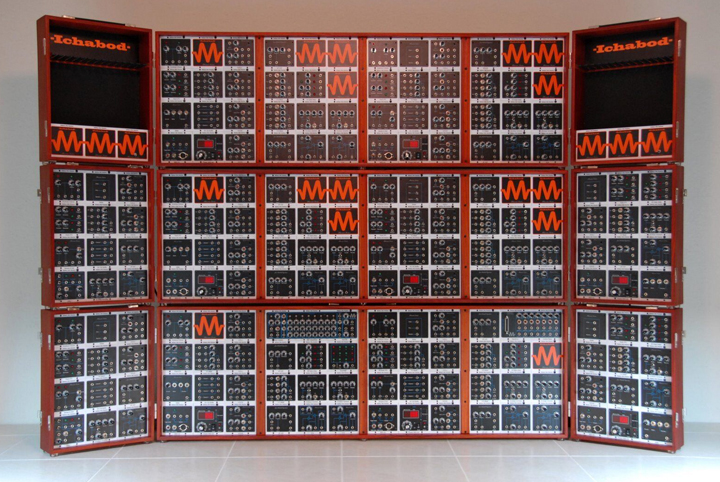When Doepfer released its A-100 in 1995, the “Eurorack” format for synthesizer modules was born. It would take several years before the true Eurorack craze hit, and these days lower cost and wide diversity has made modules more accessible to artists looking to voyage into the synth realm. Radiohead, Deadmau5, and Tool are just a sampling of the major artists who have incorporated modular equipment into their live and studio settings.
The advantage of eurorack over other modular systems like Moogs and Buchlas may be compactness, but some artists still can't resist the appeal of having a wall–sized synthesizer. There is a collection of major recording artists that still finds something sublime in cluster of wires pouring forth from a monstrous synthesizer. Lucky for us, these musicians can't seem to resist showing off their visually and technically impressive systems.
Nine Inch Nails
Whether he’s discussing the impact that Moog has had on his life and sound or how his dynamic has changed with the film scoring he has done, Trent Reznor is eloquent and direct in his thoughts on synthesis.
Working since the late 1980s, Reznor has seen the dominance of hardware synthesizers in popular music shift to software. And while Reznor mixes the paradigms in his own studio, there is obviously a special place in his heart for knobs, keys, and wires. Many videos featuring Reznor have been shot in his studio, where wallpaper is seemingly foregone for analog synthesizers and other gear.
Reznor’s studio is a cesspool of vintage and hard-to-find synthesizers, but if you can pick your way through the Oberheim Xpander and Moog Voyager XL, you’ll find a modular synthesis system that combines both Eurorack modules and Serge parts.
A cursory glance around the room will illuminate all kinds of modules. But in one especially colorful area, a herd of Metasonix modules are apparent, from the TM-1 Vacuum Tube Waveshaper/Ring Modulator to the S1000 Wretch Machine – a vacuum tube–based monophonic synthesizer.
Depeche Mode
In an interview for Keyboard Magazine, Martin Gore of Depeche Mode states that the ARP 2600, featured on recordings by Brian Eno and Stevie Wonder, was “the first legendary synth that [he] saw in the flesh.” ARP Instruments' semi–modular synth released in the early ‘70s was likely never too far from Gore's mind when he started getting into synthesizers himself.
Though Depeche Mode is one of the most loved synthesizer–centric acts in popular music history, modular synthesizers specifically are rarely discussed as a crucial part of the band's sound.
In a recent Instagram picture taken in Depeche Mode's Santa Barbara studio, the group showed off their modular and non-modular equipment, which featured the Koma Komplex Sequencer, a MakeNoise Black Shared System, and various eurorack modules.
Hot on the heels of the Vince Clark's and Martin Gore's techno record, Depeche Mode has been ramping up on its modular collection in advance of its next full–length.
Hans Zimmer
One of the biggest names in film scoring is also one of the biggest collectors of modular synthesizers. Hans Zimmer’s studio features a wall comprised entirely of modular synth equipment.
He has the largest Cirocco Modular Synthesizer system ever built – the MC 54HZ – in addition to a massive Roland - System 100M, which is described by Kevin Lightner of Synthfool! as having “58 VCOs, 37 VCFs, 32 ENVs, 12 VC phase shifters, nine sequencers, one remote controlled 4-space rackmount power supply, and 24 trunk lines.”
Comically enough, Zimmer admitted in a studio interview that he bought those pieces in the early ‘80s, when digital synthesis was taking hold. Roland was having trouble moving system 100 products, so Zimmer struck an agreement with the company. As long as he bought all of what they had, he could pay $25 per kilogram.
Zimmer also owns a coveted Moog modular system. On the score for The Dark Knight Rises, Zimmer took his favorite modules from his Moog modular and built digital controllers to utilize them. “There is something when you plug in those Moog oscillators. Something really cool happens,” he admits.
Kaitlyn Aurelia Smith
Kaitlyn Aurelia Smith's beginning in modular synthesis were influenced by a neighbor from her home on Orcas Island. After learning of Smith’s love for composer Terry Riley, the neighbor showed her a massive collection of Buchla synthesizers. Graciously, the neighbor lent those synthesizers to Smith for a year, over the course of which she was able to learn all about modulars.
Smith’s background and prowess in classical guitar and arrangement easily carry over to her work in the realm of modular synthesis, as evidenced by the gentle, tight harmonies and dynamic textures in her work.
On her recent album EARS, Smith used a 27 voice synthesizer made up of an eclectic collection of modules. Though there are too many pieces to list, notable modules include Boomstar Modular’s Charcot Circles sequencer and the Spectral Multiband Resonator – an innovative filter that can vocode, process audio like a classic filter, harmonize, and more.
Billy Corgan
Though not considered as a synth guru like the others on this list, Billy Corgan does boast a focused ear and a meticulous methodology.

The Ichabod
In 2014, Billy Corgan played an eight-hour ambient drone performance alongside an audio recording of Herman Hesse’s Siddhartha, a short novel on spiritual discovery. The set was amusingly documented in a live tweet stream by Oneohtrix Point Never's Daniel Lopatin and was received pretty poorly overall. But this performance brought Corgan's modular synthesizer fetish to the public's attention.
Corgan has used synthesizers regularly on his self-titled work, though he has rarely – if ever – performed with one in concert. On his 2005 album TheFutureEmbrace, he used an A-100 Doepfer modular rig that was programmed and assembled by Bon Harris.
However, Corgan is most commonly known for the monster synthesizer named “Ichabod” that he commissioned in 2009. Ichabod was built by George Mattson of Mattson Mini Modular and Stephen Jones of Sythnwood.
Modular Synths